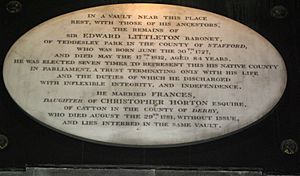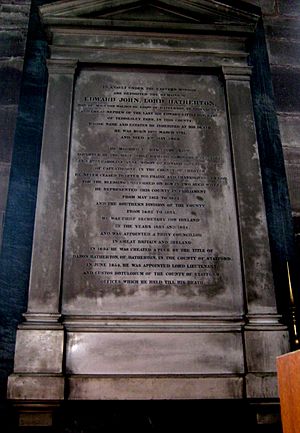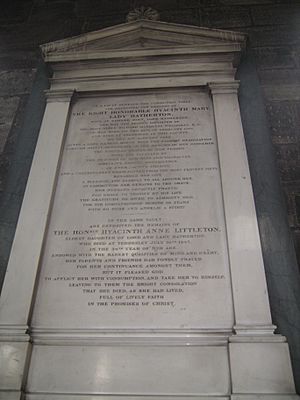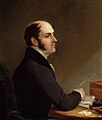Edward Littleton, 1st Baron Hatherton facts for kids
Quick facts for kids
The Lord Hatherton
|
|
|---|---|
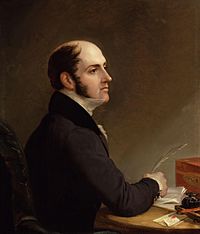
An 1834 portrait of Edward Littleton by George Hayter.
|
|
| Chief Secretary for Ireland | |
| In office May 1833 – 14 November 1834 |
|
| Monarch | William IV |
| Prime Minister | The Earl Grey The Viscount Melbourne |
| Preceded by | Sir John Hobhouse, Bt |
| Succeeded by | Sir Henry Hardinge |
| Personal details | |
| Born | 18 March 1791 |
| Died | 4 May 1863 (aged 72) Teddesley Hall, Staffordshire |
| Nationality | British |
| Political party | Tory Whig |
| Spouse | Hyacinthe Wellesley |
| Alma mater | Brasenose College, Oxford |
Edward John Littleton, 1st Baron Hatherton (born March 18, 1791 – died May 4, 1863) was an important British politician. He was a member of the Lyttelton family, which was well-known in politics. Edward Littleton started his career with the Tories but later joined the Whigs.
He had a long career in Parliament, working for over 40 years in both the House of Commons and the House of Lords. He helped create many big changes, like allowing Catholic Emancipation (giving Roman Catholics more rights). He also worked on the Truck Act of 1831, which made sure workers were paid in money, not goods. Other important laws he helped with include the Parliamentary Boundaries Act 1832 and the Municipal Corporations Act 1835. He was very interested in issues affecting Ireland and served as Chief Secretary for Ireland from 1833 to 1834.
Besides politics, Lord Hatherton was a wealthy landowner and businessman in Staffordshire. He owned farms, coal mines, quarries, and brick factories. Most of his businesses were located around Penkridge, Cannock, and Walsall.
Contents
Early Life and Education
Edward Littleton was born as Edward Walhouse. He went to Rugby School and then to Brasenose College, Oxford. In 1812, he changed his name to Littleton. This was so he could inherit the large estates of his great-uncle, Sir Edward Littleton, 4th Baronet. These estates were located near Penkridge, Staffordshire, at Teddesley Hall.
Later, in 1835, he also inherited more wealth from his uncle, Edward Walhouse. This included important mining and manufacturing businesses in Walsall and Cannock.
Political Career (1812–1833)
Edward Littleton took over his great-uncle's seat in Parliament. From 1812 to 1832, he was a Member of Parliament (MP) for Staffordshire. After that, he represented the southern part of the county until 1835. He began as a Tory but became a Whig after 1827.
Fighting for Catholic Rights
In the House of Commons, Littleton was a strong supporter of Roman Catholic emancipation. This meant giving Roman Catholics the same rights as other citizens. In 1825, he tried to pass a law to help with this. Although his first efforts failed, he later voted for the Catholic Emancipation Bill in 1829, which finally became law.
Changing His Approach
Around 1830, Littleton's way of speaking and working in Parliament changed. He started to get more involved in detailed committee work on important reforms. He spoke more often and used lots of facts and arguments. This change happened because he was talking more with ordinary people in growing towns like Stoke on Trent, Wolverhampton, and Walsall. He often shared their concerns and reports in Parliament. People began to see him as a Radical because his ideas became more progressive.
The Truck Act of 1831
After the 1830 election, a Whig government came to power. Littleton then led a campaign against the "truck system." This was a unfair practice where employers paid workers with goods or store credit instead of money. This often trapped workers in debt to the company store.
Littleton presented many requests from workers who wanted this system stopped. He argued that "the workmen must be paid in money." The Truck Act of 1831 was a major social law that made sure workers received their wages in cash. This law was so important that it was still mentioned in Parliament as recently as 2003.
During this campaign, Littleton made a comment that caused trouble. He said he didn't care about Ireland, which was heard by an Irish MP. Although he later explained his words were taken out of context, it damaged his reputation with some Irish politicians.
Reforming Parliament
Littleton then worked on the Great Reform Bill. This bill aimed to create a fairer system for electing MPs. It wanted to simplify voting rules and redraw election areas. The goal was to get rid of "rotten boroughs" (areas with very few voters but many MPs) and "pocket boroughs" (areas controlled by one wealthy person).
Littleton was a key part of this reform. He insisted that new election areas should be based on population, not old traditions. He was very knowledgeable and often argued strongly for towns like Wolverhampton and Walsall to have fair representation. The Reform Bill was so detailed that it was split into two acts. The Parliamentary Boundaries Act 1832, which redrew the maps, was largely successful because of Littleton's hard work.
Speaker of the House
In 1833, Littleton was nominated to become the Speaker of the House of Commons. This was a big honor, even though he didn't want the job. He believed the Speaker should be neutral, not tied to one political party. He spoke against his own nomination, supporting the current Speaker. His nomination, though unsuccessful, helped establish that the Speaker's role should be non-political.
Military Service
Edward Littleton also served in the military. He became a Major in the part-time Staffordshire Yeomanry in 1814. He was promoted to Lieutenant-Colonel in 1819 and led the group from 1829. He resigned in 1833 when he became Chief Secretary for Ireland.
Chief Secretary for Ireland (1833–1834)
In May 1833, Littleton became the Chief Secretary for Ireland. This was a very important role, working with the Lord Lieutenant of Ireland. His father-in-law was the Lord Lieutenant at the time. Littleton was part of a government that included both Whigs and Radicals. This made his job difficult because the two groups had different ideas, especially about Ireland.
The Tithe War
A major problem in Ireland was the issue of Tithes. These were payments that Irish people, mostly Catholics, had to make to the Protestant Church of Ireland. Many refused to pay, leading to violence in what was called the Tithe War. Littleton had to introduce a bill that made some small changes to tithe payments but still insisted they be paid. This was unpopular with many Irish people.
Littleton tried to find a middle ground. He also spoke out against police violence. However, he sometimes said things that caused problems. For example, he strongly criticized a proposal to repeal the Acts of Union 1800 (which had joined Great Britain and Ireland). His strong words upset many Irish politicians.
He also made an agreement with Daniel O'Connell, a leading Irish politician, about a new law to control violence in Ireland. But when some harsh parts of the old law were put back into the new one, O'Connell accused Littleton of lying. This led to Littleton's resignation in 1834, along with other key government members.
Career in the House of Lords (1835–1863)
In 1835, Littleton was re-elected to the House of Commons. Soon after, he was made a Baron Hatherton, which meant he became a member of the House of Lords. He took his title from Hatherton, a village where he owned Hatherton Hall. As a peer, he could no longer serve in the House of Commons.
Municipal Reform
As a Lord, Hatherton continued to work on political reforms. He was very involved in the campaign for municipal reform, which aimed to improve local government. He supported the Municipal Corporations Act 1835, which gave more power to local taxpayers. He argued strongly against corruption and for fair representation in towns and cities. He also supported similar reforms for Ireland.
Church Reforms
Hatherton also supported changes to the Church Rate. This was a required payment for maintaining Anglican churches, which upset both Catholics and other Protestants. He wanted to end this compulsory payment. He also pushed for reforms in universities like Oxbridge, arguing that their old rules needed updating for modern times.
Workers' Rights and Mines
Lord Hatherton was a strong supporter of observing the Lord's Day (Sunday). He wanted laws to stop canals and railways from operating on Sundays, so workers could have a day off. He owned canals and mines, so he had a personal interest in these issues.
He also spoke about the Mines and Collieries Act 1842. As a coal mine owner, he was involved in discussions about working conditions. He supported banning women from working in mines. However, he argued that boys as young as ten should still be allowed to work underground, claiming conditions were better in his region.
Railways and Land Management
In the 1840s, Hatherton tried to understand the rapid growth of railways. He initially worried about railways hurting his canal businesses. But later, he supported a more efficient system for railway development. He also showed himself to be a modern landlord by proposing changes to hunting laws. He wanted to remove hares from the "game" list so tenants could control them on their land, which he said made his tenants very happy.
The Irish Famine
The "Irish Question" remained a major concern for Hatherton. He supported many reforms for Irish Catholics, like better representation and support for their clergy. However, he also supported government actions to control disorder in Ireland.
The terrible Great Famine began in the 1840s. Hatherton had long supported ending the Corn Laws, which were tariffs on food imports. He strongly supported their repeal in 1846, which helped bring down the government. He believed the famine was a huge disaster and that the government needed to do more. He argued that England should treat the famine in Ireland as if it were happening in England itself. He demanded that all restrictions on food imports be removed and that England help pay for relief efforts.
His speech about the famine was very powerful and criticized the government's approach. It was a highlight of his career in the House of Lords. After this, and due to personal losses (his daughter and wife passed away), his contributions became less frequent.
He served as Lord Lieutenant of Staffordshire from 1854 to 1863, a local role with many ceremonial duties. His last speech in Parliament was in 1852, where he criticized telegraph companies for bothering residents without notice.
Business and Property
Lord Hatherton was a very wealthy man. He inherited land and businesses from both the Littleton and Walhouse families. This included almost all the land in Penkridge and large coal mines in Cannock and Walsall. He also owned quarries and brick factories. This made him a very influential landlord and employer in Staffordshire.
In 1862, a year before he died, his businesses included:
- Teddesley Hall, his home, and surrounding farms and woods.
- Land holdings in many towns and villages across Staffordshire.
- The Walsall Estate, with many properties.
- Royalties (payments) from coal mines, lime works, and brickyards in areas like Hatherton, Bloxwich, and Walsall.
- Payments from tithes (historical payments) from many occupiers in various towns.
Hatherton was also a large-scale farmer. He expanded his home farm at Teddesley to about 1,700 acres. He raised cattle and sheep and grew crops. By 1860, he even started a free agricultural college at Teddesley for 30 boys. These boys worked on the estate and received practical and formal education.
New Zealand Company
In 1825, Littleton was a director of the New Zealand Company. This company, led by John Lambton, 1st Earl of Durham, tried to establish the first British colony in New Zealand.
Family Life
Lord Hatherton married Hyacinthe Mary Wellesley in October 1812. She was the eldest daughter of Richard Wellesley, 1st Marquess Wellesley. A famous author and art historian, Anna Brownell Jameson, was a governess to their children for a few years.
Lady Hatherton passed away in January 1849 after a long illness. Their daughter, Hyacinth Anne, had died earlier in 1847. In 1852, Hatherton married Caroline Davenport. He died at his home, Teddesley Hall, in May 1863, at the age of 72. He was buried with his first wife and daughter at Penkridge parish church. His son, Edward, inherited his title.
Images for kids
-
An 1834 portrait of Edward Littleton by George Hayter.
 | Anna J. Cooper |
 | Mary McLeod Bethune |
 | Lillie Mae Bradford |


